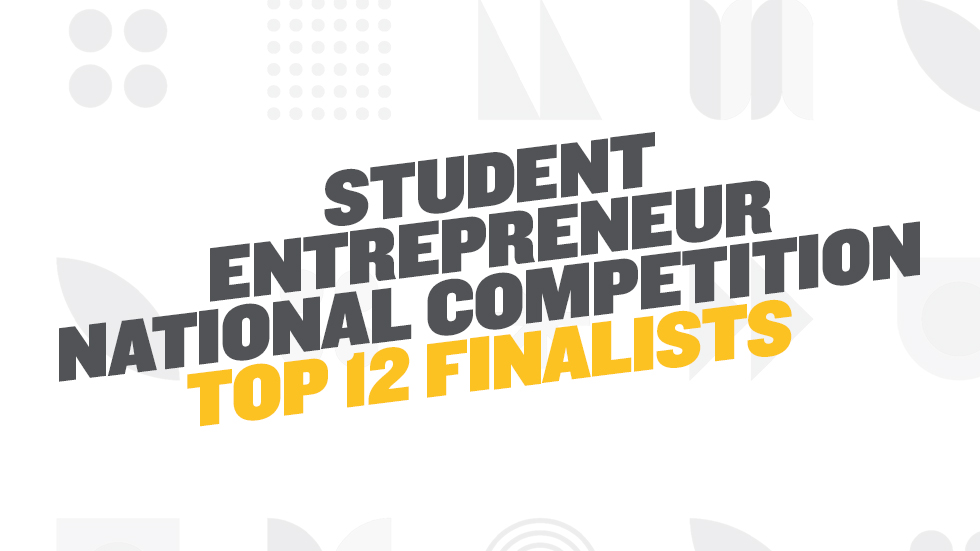Over 100 of some of the most innovative entrepreneurial businesses in Canada were nominated for the Enactus Canada 2025 Student Entrepreneur National Competition. Most impressively, these entrepreneurs are all full-time post-secondary students who have launched and are managing their business, while balancing the demands of school.
The 12 finalists were selected from a pool of 107 student entrepreneurs by panels of judges in the first round of competition and three will be selected to compete live at the 2025 Enactus Canada National Exposition, taking place May 6-8 in Calgary, Alberta. The winner will receive national recognition, mentorship opportunities, and $10,000 to support the continued growth of their business.
For the past 25 years, the Enactus Student Entrepreneur National Competition has been one of the largest Canadian programs focused on supporting full-time post-secondary student entrepreneurs. The competition is part of Enactus Canada’s commitment to growing the pipeline of small businesses and entrepreneurial talent in Canada.
The finalists for the 2025 Student Entrepreneur National Competition are:
—
askihk Research Services – Micaela Champagne, University of Saskatchewan
askîhk ᐊᐢᑭᕁ Research Services (ARS) is a community-minded and Indigenous-owned company conducting research around the legacy of Residential Schools in Canada. Committed to providing ethical, respectful, and culturally sensitive work, ARS ensures work is done responsibly until each child is brought home.
CELLECT Laboratories Inc. – CT Murphy, University of Waterloo
Cellect revolutionizes cervical cancer and HPV screening with a non-invasive, nanotechnology-powered menstrual blood collection device. This innovation bridges the gap in women’s health diagnostics, enabling early detection and empowering health equity, particularly in underserved communities.
Independence Robotics – Laila Burns, University of Ottawa
Independence Robotics helps people with limited mobility gain independence through affordable assistive devices. Their flagship product – a mobile robotic arm with custom controls – navigates homes, retrieves objects, and performs everyday tasks in a user-friendly manner.
Kalego Solutions Inc. – Marine Queffeulou, Université Laval
Kalego Solutions uses patented plasma technology to deliver a permanent, chemical-free, anti-fog treatment for endoscopic lenses used in medical treatments. This improves precision and outcomes while reducing patient risk and procedure costs — setting a new standard in endoscopy care.
MiON Forest – Sanghyun Kim, Université du Québec à Montréal
MiON Forest has created the world’s first tree-planting drones. These drones use biodegradable seedling capsules that enrich the soil microbiome to plant seedlings instead of just scattering seeds, making reforestation faster, more effective, and sustainable.
NeedleAID – Jamie Magrill, McGill University
NeedleAID has invented, filed patents for, and sells an easy-to-use device which streamlines the needle preparation process and eliminates needle-stick injuries that can occur in hospitals. These injuries cost the healthcare industry $1B annually in expenses and lost work.
OneDrug Inc. – Chukwunonso Nwabufo, University of Toronto – St. George
OneDrug has developed smart, point-of-care technologies that read patients’ genetic profiles for clinically relevant drug processing proteins in real-time and empowers healthcare providers to individualize patient treatments. This facilitates quicker recovery, reducing the occurrence of adverse drug effects, and saving healthcare costs.
PhyCo Technologies Inc. – Ranah Chavoshi, Simon Fraser University
PhyCo is a B2B biomaterial manufacturing company on a mission to reduce plastic pollution and keep plastic out of food systems. In partnership with Indigenous nations, PhyCo is developing earth-digestible and non-toxic bioplastics derived from seaweed.
Power of Play Innovations – Deena Al-Sammak, McMaster University
Power of Play is creating a child-friendly tool that accurately measures grip and pinch strength in young patients, raising the standards in pediatric rehabilitation therapy. The product makes data collection easy for rehabilitation therapists while being engaging and enjoyable for children to improve patient care outcomes.
PragmaClin Research Inc. – Bronwyn Bridges, Memorial University of Newfoundland
PragmaClin’s PRIMS (Parkinsons Remote Interactive Management System), is a digital tool that uses depth cameras and machine learning to monitor and assess the symptoms of Parkinson’s Disease, providing healthcare professionals with remote and in-clinic insights to improve treatment decisions.
ScanSolve – Collins Chukwuma, Memorial University of Newfoundland
ScanSolve simplifies learning by using AI to guide students through problems step-by-step, offering personalized explanations that match their learning style. Accessible anytime, it transforms how students understand and solve academic challenges, making education more approachable and effective.
Xatoms – Diana Virgovicova, University of Toronto – St. George
Xatoms uses patented AI and quantum chemistry technology to discover new materials capable of purifying water from contaminants and pollutants without the need for electricity. This infrastructure-free solution improves water quality and accessibility for underserved communities while addressing global water crises.
—
Follow Enactus Canada on Instagram, LinkedIn, and Facebook to see the announcement of our three finalists at the end of March.
